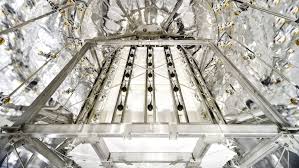Neutrino Fog:

The LUX-ZEPLIN (LZ) experiment, one of the many dark matter detection efforts globally, recently reported its findings, which placed the tightest restrictions yet on the possible identity of dark matter particles.
- “Neutrino fog” refers to the interference caused by neutrinos—ghostly particles produced by the Sun and cosmic events—in detecting dark matter.
- Since neutrinos rarely interact with matter, they pass through almost everything, including dark matter detectors.
- Dark matter detection experiments, like LUX-ZEPLIN, are becoming increasingly sensitive, but they also detect neutrinos. This creates “fog,” or background noise, making it harder to distinguish between neutrinos and dark matter signals.
- Neutrinos mimic the weak signals expected from dark matter, confusing results.
- Neutrino fog sets a boundary on how sensitive future dark matter experiments can be.
- Developing methods to differentiate neutrino signals from dark matter is a key challenge for advancing research.




